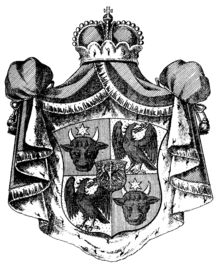Ypsilantis
Ypsilantis ( Greek Υψηλάντης Ypsilandis [ ipsiˈlandis ]) is a Greek- Phanariotic family name . In declined forms the name is Ypsilanti , which outside the Greek-speaking area has often become the binding form of the name.
Origin and meaning
The Ypsilanti are an important Greek-Phanariotic princely family, which is documented until the year 1064, originally came from Trapezunt ( Turkish Trabzon ), later mainly based in Constantinople and whose members held high state offices in the Ottoman Empire as well as in independent Greece clothed. In 1390 Konstantin Ypsilanti, Grand Master of the palace , the daughter of Emperor Emanuel III. Komnenos married.
Athanasius Ypsilantis, Grand Dragoman of the Porte , was elected Prince of Moldavia in 1758. Alexander († 1807) became Prince of Wallachia in 1774 and Prince of Moldova in 1785. His son Constantine († 1816) became Prince of Moldavia in 1799 and Prince of Wallachia in 1802. In 1806 he united both principalities under his suzerainty by electing the Moldavian Dīwāne , which he voluntarily resigned after the Peace of Tilsit in 1807.
His son Alexander († 1828) was elected head of the Greek organization Filiki Eteria in 1820 , organized the uprising and began the War of Liberation in 1821. After his death, his brother Demetrios († 1832) took his place and drove Ibrahim Pasha's army from Morea and ended the war of freedom with the battle of Petra . Georg († 1847) was General Brigadier and Nikolaus († 1833) was Chief of the General Staff.
The youngest brother Gregor (1805–1835) left a son of the same name (1835–1886) who, as the royal Greek envoy to Vienna, married Helena in 1862, a daughter of Baron Georg Simon von Sina († 1856). Through them, Rappoltenkirchen Castle near Sieghartskirchen came into the possession of the Ypsilanti family, who owned it until the end of the 20th century. Likewise, the Moravian rule Rossitz belonged to the Ypsilantis in the second half of the 19th century.
After the textile baron Johann von Mundy († 1872) the family owned Eichhorn Castle near Brno . In 1896 the castle became the property of the English nobleman Maurice Arnold de Forest.
coat of arms
The main shield is square and covered with a heart shield , in it in blue a silver phoenix rising from flames in the base of the shield . Box 1 and 4: Principality of Moldova (Moldova); Field 2 and 3: Principality of Wallachia . A prince's hat rests on the main shield , the whole thing is surrounded by a purple coat of arms that falls from a prince's crown .
Name bearer
- Alexander Ypsilantis (Dragoman) (1725–1807), Greek dragoman, voivode of Wallachia and Moldova
- Alexander Ypsilantis (General) (1792–1828), Greek general in Russian service
- Andrea Ypsilanti (born Dill , * 1957), German politician (SPD), was married to Manolis (Emmanuel) Ypsilanti
- Dimitrios Ypsilantis (1793–1832), general in the Greek War of Independence against the Turks, namesake of the city of Ypsilanti (Michigan)
- Emanuel Ypsilanti (1877–1940), Greek diplomat and politician
- Georg Ypsilanti (1950–2012), Greek-Austrian artist
- Gregor Ypsilanti (1835–1886), Greek diplomat
- Konstantin Ypsilantis (1760–1816), Prince of Wallachia
- Miljeva Ypsilanti (1917–2013), Austrian doctor and art patron
- Thomas Ypsilanti (1909–1966), Greek diplomat
- Thomas Ypsilantis (1928–2000), American physicist
Individual evidence
- ↑ Phanar was the official residence of the Greek Orthodox Patriarch of Constantinople and, until the mid-1950s, it was mainly an area around the Patriarchate that was inhabited by Greeks.
- ^ Eugène Rizo-Rangabé: Livre d'or de la noblesse phanariote en Grèce, en Roumanie, en Russie et en Turquie . Volume 1. 1892, pp. 152-156
- ↑ a b Heinrich Kadich von horse : The Moravian nobility . 1899, p. 185 (PDF)
- ↑ Almanach de Gotha , Gotha 1888, Justus Perthes , p. 281 f.
